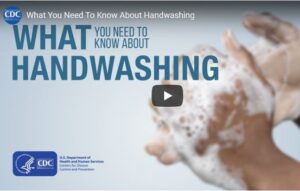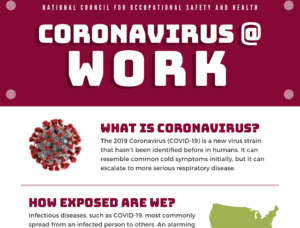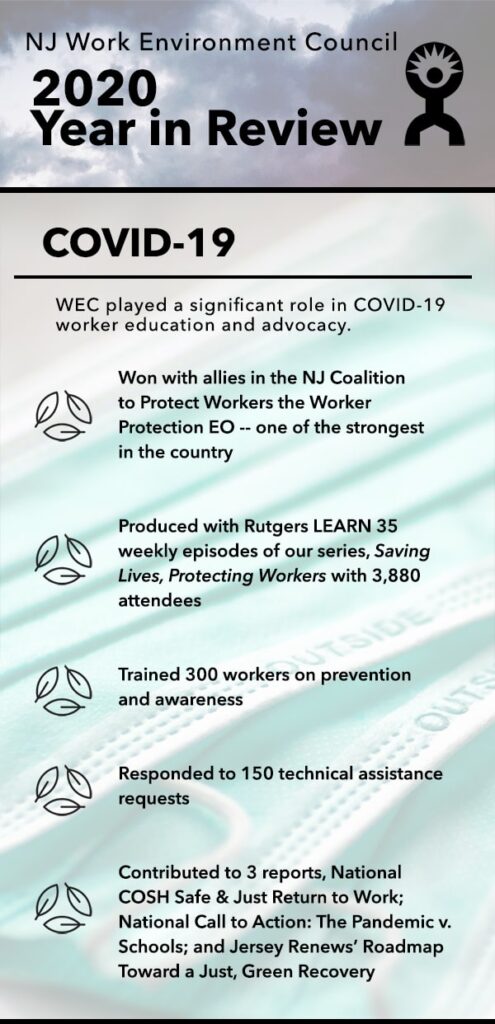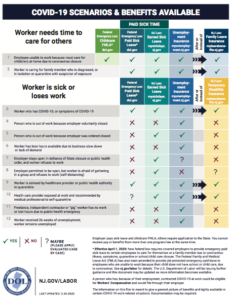COVID-19 Resources
What is COVID-19?
The most recent coronavirus, COVID-19, is a new strain of virus that hasn’t been identified before in humans. The COVID-19 virus is a respiratory pathogen that is highly contagious, and it is far more lethal than the flu virus.
Some symptoms of coronavirus include – fever, cough, body aches and tiredness and they can worsen and cause pneumonia, fluid in the lungs that leads to shortness of breath. The COVID-19 illness is more severe than the flu, and the chance of dying from it is greater than the seasonal flu, estimates up to 30x greater risk of death. COVID-19 has been able to spread from person to person very easily and requires an immediate response to protect workers and the general public.
The best way to prevent illness is to avoid being exposed to this virus. Some recent studies have suggested that COVID-19 may be spread by people who are not showing symptoms. The virus is thought to spread mainly from person-to-person, between people who are in close contact with one another (within about 6 feet), through respiratory droplets produced when an infected person coughs, sneezes or talks because these droplets can land in the mouths or noses of people who are nearby or possibly be inhaled into the lungs.
Protect Yourself!
Steps to Take to Protect Yourself
Below are some steps you can take to protect yourself at work or in your daily life. This is not a comprehensive list. It is important to note, as more is learned about COVID-19, the Center for Disease Control and Prevention (CDC) continues to update their guidance on how to protect yourself. For the most recent updates, visit the CDC website.
- Wear a mask to protect yourself and others and stop the spread of COVID-19. Wear your mask over your nose and mouth and secure it under your chin. Fit the mask snugly against the sides of your face, slipping the loops over your ears or tying the strings behind your head.
- Stay at least 6 feet (about 2 arm lengths) from others who don’t live with you.
- Avoid crowds. The more people you are in contact with, the more likely you are to be exposed to COVID-19.
- Avoid poorly ventilated spaces.
- Wash your hands often. If soap and water are not readily available, use a hand sanitizer that contains at least 60% alcohol.
- Monitor health daily.
- Get Vaccinated to Protect Against COVID-19
- Clean and disinfect objects and surfaces you touch often. Use cleaning products as directed.
Employers should follow the MOST protective guidance and standards issued by state or federal agencies. If guidance contradicts each other, the MOST protective should be implemented.
COVID-19 Weekly Updates: Saving Lives, Protecting Workers
In this weekly series, we will hear from and talk with public health experts, government officials, medical personnel, front-line workers and worker representatives about the latest developments in the fight against COVID-19. The series is sponsored by WEC, Rutgers Learn and Jersey Renews and airs on Tuesday @ 12pm. Want to receive weekly series emails, sign up here.
Past Webinar Summaries
May 5: Worker and Community Health
This Week’s update focused on family safety, health and well-being, how to protect children and families, and what we can expect from State agencies and their service provider partners. We were joined by Katherine Stoher, Deputy Commissioner of Operations, New Jersey Department of Children and Families (DCF) and Laura Johnson, Assistant Research Professor at the Center on Violence Against Women and Children (housed within the Rutgers University School of Social Work) to discuss family well being during COVID-19. More than 140 participants attended this webinar.
Deputy Commissioner Stoher provided an overview of the types of services families can access. Additional challenges families […]
April 28: NJ Whistleblower Protections – what is says, what it doesn’t, and how to use it
This week’s update featured labor and employment attorneys Rosemarie Cipparulo and David Tykulsker discussing whistleblower protections in New Jersey, including the Conscientious Employees Protection Act (CEPA). 130 participants joined us for the discussion.
Rose and David gave us an overview of the law and discussed its relationship to other available remedies and protections. We learned: that to qualify for CEPA protection the specifics of the correction required must be first submitted in writing to one’s employer or agency; that the situation to be corrected must be in violation of an existing law or binding regulation (such as the governor’s recent executive orders […]
April 21: Questions and Answers with OSHA
We […]
April 12: Question & Answer Session with Deborah Cornavaca, Deputy Chief of Staff for Governor Murphy
For the third webinar in this series and were honored to welcome Deborah Cornavaca, Deputy Chief of Staff for Governor Murphy. Ms. Cornavaca spent the entire hour with us for a virtual question and answer session regarding safety measures taken by Governor Murphy to prevent the spread of COVID19 including recently signed Executive Order 122 that requires certain essential businesses to take additional safety measures.
We’d like to thank Ms. Cornavaca for joining us, and for offering her enormous wealth of insight on our state government’s efforts to mitigate this crisis and her willingness to answer so many questions and listen to the […]
April 7: Recap From the Front Lines: Heroism, Shortages and Best Practices
From the current shortage of PPE to the coming hospital bed shortage, we heard what it is like for employees to go to work during this pandemic. Some employers have not implemented or enforced social distancing guidelines or provided proper PPE, while other employers have enacted stronger safety and health measures. We discussed best practices employers can implement, victories won by unions to improve worker protections and what needs to be done to protect workers and their families. There were 100 attendees that participated. We heard from:
- Darren A. Spielma, PhD, Executive Director of The Senator Walter Rand Institute for […]
The COVID-19 webinar series is sponsored by



Benefits for Workers
NJ Department of Labor and Workforce Development Resources
- What NJ Workers Need to Know about the Families First Coronavirus Response Act Factsheet
- NJ Division of Unemployment: https://myunemployment.nj.gov/
- Guidance for Self-Employed Individuals Filing a Pandemic Unemployment Assistance Claim and FAQs
- NJ Family leave Insurance: https://myleavebenefits.nj.gov/labor/myleavebenefits/worker/fli/index.shtml
- NJ Earned Paid Sick Leave: https://www.nj.gov/labor/worker-protections/earnedsick/law.shtml
- NJ Temporary Disability Insurance: https://myleavebenefits.nj.gov/labor/myleavebenefits/worker/tdi/index.shtml
Federal Paid Sick Leave and CARES act expansions and stimulus
- US Department of Labor: Families First Coronavirus Response Act: Employee Paid Leave Rights



